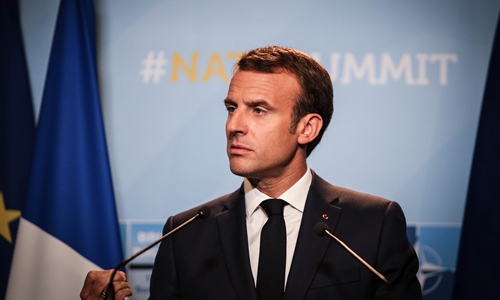HOME >> OPINION
Macron’s ‘brain-dead’ label for NATO points at growing chasm between Europe and US
By Sun Keqin Source:Global Times Published: 2019/11/14 21:48:40

French President Emmanuel Macron Photo: IC
Recently, French President Emmanuel Macron rubbed European leaders the wrong way by calling NATO brain-dead, further aggravating the trans-Atlantic rift that has often seen the US and Europe at loggerheads. His comments were published by The Economist which also quoted the young French leader as saying "America is turning its back on the European project."
European leaders came out to reject Macron's statements. German Chancellor Angela Merkel called his words "drastic." Polish Prime Minister Mateusz Morawiecki described the statements as "irresponsible."
Based on how Macron has behaved since taking office, his comments on NATO are not whimsical, revealing his lack of trust for the US and NATO and strategic emphasis on building a strong European Union (EU).
Since the demise of the Cold War, the US and Europe have all been for the NATO, which has been the linchpin of trans-Atlantic ties. It is the foundation of the Western alliance and a means by which the US controls Europe. Without NATO, the US and Europe may pull different ways. NATO still plays its role in safeguarding the security of Europe and guarding against Russia after the Cold War.
However, the value which the military alliance brings with itself has always been questionable. The organization's Eastward expansion has squeezed Russia's strategic space, triggering fresh acrimony with the Kremlin. And dealing with the challenge has been the most difficult subject.
Furthermore, faced with new non-traditional security threats, such as terrorism and refugee crises, many people have proposed to reform NATO, enabling it to effectively combat these new challenges. While the EU emphasizes the threat perception from the response to the crises faced by bloc members, Washington needs the organization to toe the line in terms of its global strategy, such as NATO's presence in Afghanistan and Iraq.
Additionally, the US has shifted its strategic focus to the Asia-Pacific region, and NATO's strategic status from the perspective of Washington has been eroded. Arguing that the military alliance has cost Washington plenty of funds and energy, US President Donald Trump's administration has asked NATO allies to raise their defense spending and take more responsibility.
These controversies reflect heightened tensions between Europe and the US. Considering these US moves, Macron doubts whether NATO can guarantee the security of EU members. These European countries regard many US actions as unreliable, especially Trump's decision to withdraw troops from Syria.
In this context, Macron may intend to criticize Washington by expressing discontent with NATO. His core idea is to build stronger, French-dominated and independent European defense capabilities, in an attempt to develop European military sovereignty. Building the EU into a strategic geopolitical power, he hopes to assure the bloc's interests and global status in times of great power competition.
It is not the first time that Macron has poured cold water on US-Europe relations. In August 2018, Macron told French diplomats and lawmakers in a speech, "Europe can no longer rely on the United States for its security." Divergences between Europe and the US are reflected in various domains such as strategy, economy, values, global governance, and geopolitics.
Against the backdrop of international unrest, Europe hopes to coordinate with the US on many issues, in order to maintain its superiority in the non-Western domain. However, since taking office, Trump has been cranking up nationalism and "America First." The US is not only targeting emerging powers, but also cracking the whip and slapping sanctions on its allies. For example, the US imposed tariffs on a record $7.5 billion worth of European products, which undermines the interests of Brussels.
Although the US and Europe are allies and remain one in terms of the political values of democracy and freedom, they differ on many other values. For example, the US has been promoting unilateralism and protectionism, while Europe is all for multilateralism.
The two sides are also at odds over global governance. Europe attaches importance to climate change issues as does the entire world, but for the White House these days the boot is on the other foot. Washington's withdrawal from the Paris Agreement has become a leitmotif of its recklessness on a subject that is on top of the European agenda.
European countries also differ among themselves on how to deal with the US, which has greatly influenced European diplomacy as a whole. The rift between Europe and the US is evident and is widening though the two sides are still allies.
The author is a research fellow at the China Institutes of Contemporary International Relations. opinion@globaltimes.com.cn
Posted in: VIEWPOINT